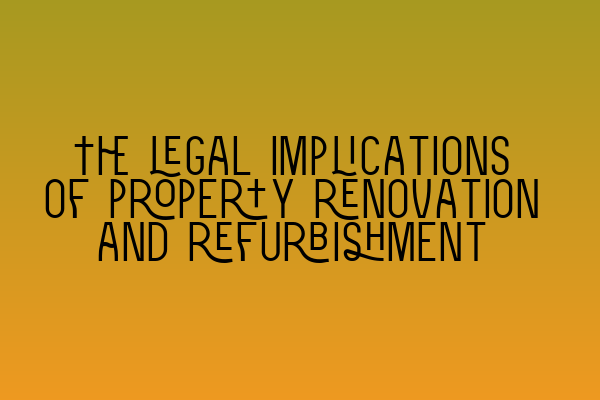The Legal Implications of Property Renovation and Refurbishment
Property renovation and refurbishment can be an exciting and rewarding endeavor. Whether you’re converting an old house into a modern home, refurbishing a dilapidated property for rental purposes, or upgrading a commercial space to attract new tenants, it’s important to understand the legal implications that come with these projects. In this blog post, we will discuss some of the key legal considerations you need to be aware of when embarking on a property renovation or refurbishment.
Building Regulations and Planning Permissions
Before you start any renovation or refurbishment work, it’s crucial to ensure that you have the required planning permissions and building regulations approvals in place. The planning permission process ensures that your proposed changes are in line with local development plans and regulations, while the building regulations approval ensures that the work meets safety and quality standards.
It is worth noting that certain alterations may not require planning permission, such as internal renovations that do not affect the exterior of the property. However, it’s always best to consult with a professional who can guide you through the relevant regulations specific to your project.
Related Article: SQE 1 Practice Mocks FLK1 FLK2
Party Wall Agreements
If your property renovation or refurbishment involves work on a shared wall or structure, such as a party wall, you may need to obtain a party wall agreement. A party wall agreement is a legal document that sets out the rights and responsibilities of the property owner and the neighboring property owner(s) regarding the work being carried out.
This agreement is essential to prevent disputes and ensure that any potential damage caused during the construction process is properly addressed. It’s important to note that failing to obtain a party wall agreement can lead to delays in your project and potential legal consequences. Therefore, it’s advisable to consult with a solicitor who specializes in property law to ensure compliance with all relevant requirements.
Health and Safety Obligations
When carrying out any renovation or refurbishment work, you have a legal duty to ensure the health and safety of workers, visitors, and anyone who may be affected by the project. This includes providing a safe working environment, implementing proper safety measures, and complying with relevant health and safety regulations.
It is vital to conduct risk assessments and put in place any necessary safety measures to mitigate potential hazards. This may include providing personal protective equipment (PPE), installing temporary barriers, or arranging for any necessary permits or licenses.
Related Article: SQE 1 Preparation Courses
Contracts and Insurance
Before commencing any renovation or refurbishment work, it is crucial to have appropriate contracts in place. A well-drafted contract will outline the terms and conditions of the project, including scope of work, payment terms, deadlines, and dispute resolution mechanisms.
In addition to contracts, it is important to have adequate insurance coverage in place. This may include public liability insurance, employer’s liability insurance, and contract works insurance to protect against any unforeseen events or accidents that may occur during the project.
Environmental Considerations
Environmental regulations are becoming increasingly important in property renovation and refurbishment projects. There may be specific requirements regarding waste management, energy efficiency, and sustainable building practices that need to be taken into account.
It’s important to ensure that your project complies with all relevant environmental regulations. This may involve using sustainable materials, implementing energy-efficient systems, and properly disposing of any waste or hazardous substances generated during the construction process.
Related Article: SRA SQE Exam Dates
Conclusion
Property renovation and refurbishment can be a complex process with various legal implications. Understanding and complying with the relevant regulations and requirements is essential to ensure a successful project and to avoid any legal issues down the line.
If you’re considering a property renovation or refurbishment, it is highly recommended to seek professional advice from a solicitor who specializes in property law. They can guide you through the entire process, help you navigate the legal landscape, and ensure that you are in compliance with all necessary regulations.
Related Articles:
